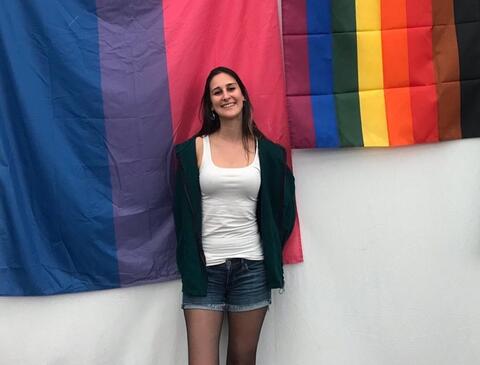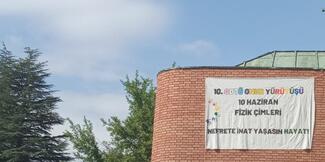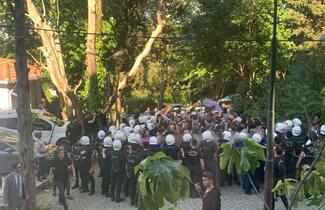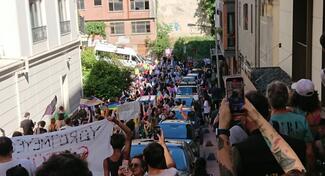
CIVICUS speaks about 2023 Pride and the civil society response to the Turkish government’s anti-LGBTQI+ campaign with Damla Umut Uzun, international relations and fundraising officer at Kaos Gay and Lesbian Cultural Research and Solidarity Association (Kaos GL).
Founded in 1994, Kaos GL is one of the oldest and largest LGBTQI+ organisations in Turkey, dedicated to creating visibility and understanding and promoting LGBTQI+ human rights.
How have Turkish authorities reacted to Pride events?
- Since 2015, Pride events have been increasingly banned by city governors. The first ban was introduced in Istanbul, which in 2014 had the largest Pride gathering, with at least 50,000 participants. But despite the growing number of bans, the number of Pride events across the country has also consistently increased.
This year in Istanbul, several Pride events were banned by district governor offices, resulting in detentions, police brutality and restrictions on journalists. A Pride movie event organised by the University Feminist Collective in Şişli was banned for ‘potentially causing societal resentment’ and ‘threatening social peace’. The screening of the film ‘Pride’, scheduled by the cinema collective, and a tea gathering event organised by the LambdaIstanbul LGBTQI+ Solidarity Association were banned in Kadıköy district. The police detained and later released at least eight people who came to watch the film, using physical violence. The LGBTQI+ group Queer Baykuş of Mimar Sinan Fine Arts University had their posters violently confiscated by the university’s security units before a planned press release. On 18 June, during the Trans Pride Parade in Beyoğlu district, the police handcuffed and detained 10 people, including a child, and released them later that day after taking police statements. Journalists were prevented from taking pictures during the intervention.
The Human Rights Foundation of Turkey compiled a detailed report of rights violations in the context of 2023 Pride events between 2 June and 10 July 2023. Various Pride celebrations, including parades, picnics and press statements, were banned by multiple governorships and disrupted due to targeted threats and societal reactions in Adana, Ankara, Antalya, Eskişehir, Izmir, Kocaeli and Muğla. A total of 241 people, including four minors and seven lawyers, were detained on the grounds of Article 2,911 of the law on gatherings and demonstrations. The main reasons cited by authorities were non-compliance with regulations, disruption of public order and violation of ban decisions. Although most detainees were typically released on the same day, they might face prosecution and lawsuits months later.
Police interventions during Pride events are a reflection of the government’s hostility towards LGBTQI+ people. They are waging a kind of war against us. The recurring violence is fuelled by a sense of impunity: the fact that law enforcement officials face no consequences for harming, insulting or harassing LGBTQI+ people further emboldens them.
Why is the Turkish government hostile towards LGBTQI+ people?
- Oppression of the LGBTQI+ community in Turkey is not new: the government’s crackdown first intensified following the 2016 attempted coup. But the main reason behind the increasing hatred is the attempt of the ruling Justice and Development Party (AKP) to mobilise conservative segments of society. To mask the effects of its corrupt rule and economic mismanagement, the government is employing populist rhetoric and polarisation tactics, seeking to designate an enemy to blame.
Repression hasn’t been limited to LGBTQI+ people but rather targeted at any opposition or independent views. Dissenting voices, including those of Kurdish people, feminists and human rights defenders, are labelled as ‘terrorists’.
Among these groups, LGBTQI+ people are a particularly easy target due to societal conservatism and religious tendencies. Censorship and rights violations of LGBTQI+ people affect all aspects of life, including access to goods and services, education, healthcare and housing and media representation. In line with the global anti-gender trend, the government has employed a rhetoric focused on ‘protecting the sacred Turkish family structure against perversion’, using LGBTQI+ people and feminists as scapegoats.
What role did anti-LGBTQI+ rhetoric play in the 2023 presidential elections?
- Anti-LGBTQI+ rhetoric played a significant role in the election campaigns of the AKP government and President Recep Tayyip Erdoğan, aimed at mobilising conservative voters, including those on the left side of the political spectrum. Former Interior Minister Suleyman Soylu openly mobilised hate speech against LGBTQI+ people at public events. President Erdoğan used similar rhetoric, accusing the opposition of being ‘pro-LGBTQI+’.
Unfortunately, two radical Islamist parties, Hüdapar and New Welfare, have entered parliament, and their primary election promise was to close down LGBTQI+ organisations. They are now working actively towards this goal, and we anticipate that such rhetoric and efforts will intensify in the run-up to local elections in a few months.
How are LGBTQI+ organisations, including Kaos GL, responding to these attacks?
- Despite facing oppressive conditions and lack of opportunities, the LGBTQI+ movement in Turkey remains resilient and strong. Alongside feminists, we are the only groups that continue to take to the streets and demonstrate for our rights, showing immense bravery in the face of police violence and detention. Simply persisting in organising demonstrations is an achievement in itself.
In addition to street activism, Turkish LGBTQI+ organisations are actively engaged in advocacy, the promotion of visibility and capacity building. We recognise that we won’t be able to change policies at the national level due to the AKP’s absolute majority, so we focus our efforts on grassroots societal transformation. We educate professionals who encounter LGBTQI+ people in their daily work, such as doctors, nurses, teachers, lawyers and social and municipal workers, to increase their understanding and capacity to work with LGBTQI+ people and respond to their needs in the respectful manner.
We document human rights violations and hate crimes, providing a factual basis for our advocacy campaigns. We also report on the situation of LGBTQI+ employees in the public and private sectors. Other organisations focus on reporting the challenges faced by LGBTQI+ students, people living with HIV, elderly people and refugees.
We also organise cultural events, including queer film festivals such as Pink Life Queer Fest and exhibitions and art programmes like the Ankara Queer Art Programme and the Women-to-Women storytelling contests, aimed at fostering expression and community engagement.
What obstacles do you encounter in your work, and what support do you need?
- Since the attempted coup, the government has intensified its crackdown on civil society organisations (CSOs), subjecting them to frequent state audits to identify alleged mistakes, impose fines or even shut them down. Laws such as the Law on the Prevention of the Financing of the Proliferation of Weapons of Mass Destruction have made it increasingly difficult for CSOs to receive funds, further hindering their work.
Turkish LGBTQI+ organisations maintain close contact with European human rights organisations, Council of Europe representatives, the European Union (EU) delegation and United Nations mechanisms. We regularly update them about the developments and shrinking human rights space in Turkey, and in turn, they issue statements expressing deep concern about the government’s actions. However, these efforts have proven ineffective as the AKP government demonstrates a complete lack of regard and even fails to implement decisions of the European Court of Human Rights.
Turkish LGBTQI+ organisations have generally benefitted from EU funding, but this has started to decrease. It appears that the EU has somewhat given up on Turkey, since the government is making no effort to improve human rights standards. Additionally, the fact that Turkey is keeping millions of refugees out of Europe has limited the EU’s consistency in supporting human rights in Turkey.
As LGBTQI+ individuals living in Turkey, we are constantly pressured to hide our identities, pushed to the margins of society and silenced. But as LGBTQI+ organisations we continue to fight for our rights and freedoms. To advance our cause, we need more systematic financial resources, increased collaboration with international organisations, more vocal campaigns and international pressure on the Turkish government.


